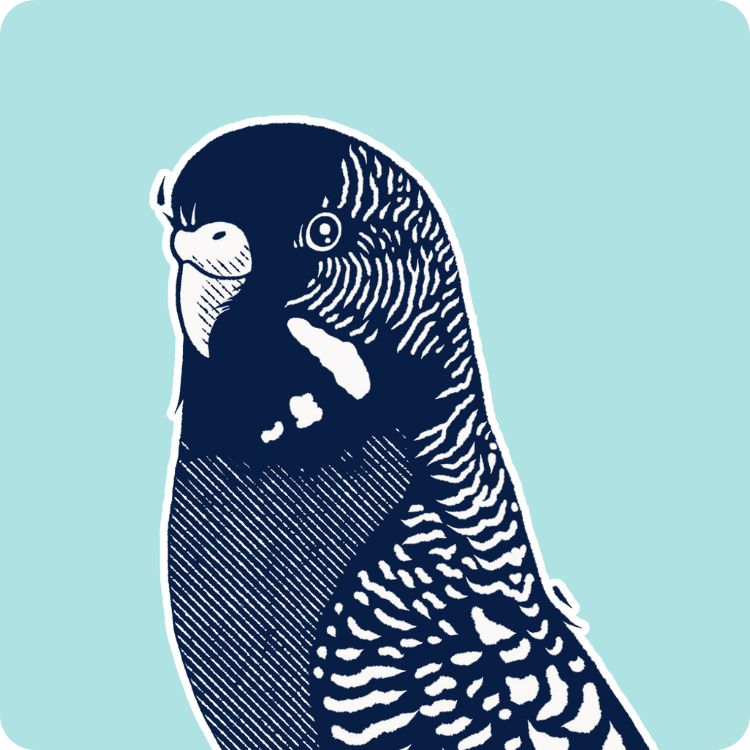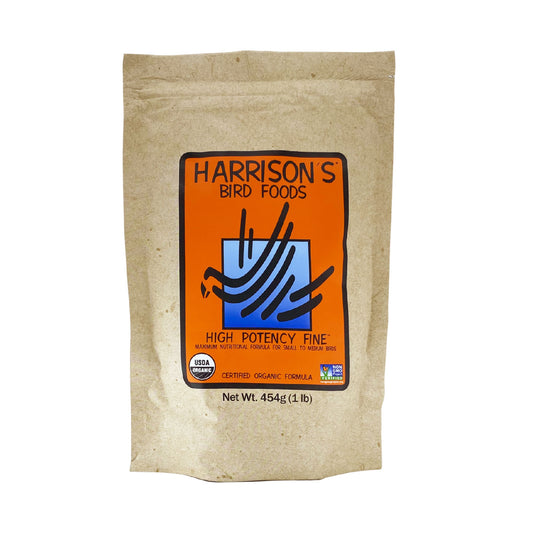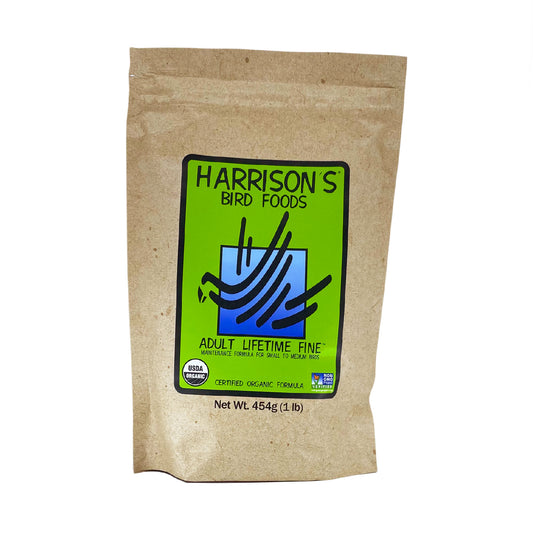

Budgie Nutrition
Good nutrition is the foundation of a healthy, active budgie. These small parrots are especially prone to issues like obesity and iodine deficiency when fed seed-heavy diets. To thrive, budgies need a varied mix of pellets, fresh vegetables, occasional fruits, and targeted supplements. Understanding their nutritional needs helps support better energy levels, feather condition, and a longer, healthier life.
Diet Breakdown
-

60 - 70% Formulated Pellet Diets
Pelleted diets are designed to meet all of your bird’s nutritional needs and help prevent the selective eating often seen with seed-based diets. Transitioning an adult budgie from seeds to pellets takes time and patience. Start by gradually reducing the amount of seed offered over several weeks while providing pellets in a separate dish. Don’t remove seeds entirely until your bird is consistently eating pellets, along with fresh vegetables and occasional fruit.
Need help making the switch? Check out our Step by step guide to pellet conversion.
-

20 - 30% Vegetables, Sprouts and Fruit
Fresh produce should make up around 20–30% of a budgie’s diet, with a focus on vegetables, herbs and weeds which provide essential vitamins and minerals. Fruits can be included in small amounts, but should be limited due to their high sugar content.
Vegetables, sprout, fruits, and herbs can be chopped or offered in small bunches to encourage natural foraging. If your budgie doesn’t take to greens straight away, don’t give up, keep offering a variety and rotate options regularly. Patience and consistency are key to building healthy eating habits.
NOTE: Avoid low-nutrient options like iceberg lettuce, and never feed toxic foods such as avocado. Always wash produce thoroughly to remove pesticides or other residues.
-

5% Seeds and Nuts
Seeds and nuts should make up only a small part of a budgie’s diet—no more than 5%. While seeds are high in carbohydrates, they’re low in many essential nutrients. Similarly, products like seed bells, millet sprays, moulting foods, and conditioning mixes are mostly seed-based and offer limited nutritional value.
A few safe nuts like almonds, walnuts, or cashews (unsalted and offered in small amounts) can be given occasionally as treats, especially for training or enrichment. However, due to their high fat content, they should be used sparingly.
-

Water
Fresh, clean water should be accessible at all times. If using gravity-based water containers, these should be thoroughly cleaned daily, as bacteria and biofilm can accumulate quickly.
Supplements
Supplementation and Special Diet Needs
Apple Cider Vinegar (ACV)
Apple cider vinegar can support digestive health in finches by helping maintain the natural acidity of the crop and promoting a balanced gut environment. It may also provide mild antimicrobial benefits, reducing the growth of harmful bacteria and yeast. Use raw, unpasteurised ACV with “the mother” and add 5 mL per litre of fresh drinking water.
Multivitamins
Even with a balanced diet, birds can miss important nutrients, especially fussy eaters. A water soluble multivitamin given 1–3 times per week helps fill nutritional gaps and support overall health.
Iodine and Budgie Health
Budgies have a higher iodine requirement than most other bird species. Iodine is critical for proper thyroid function, and a deficiency can lead to goitre, breathing difficulties, and poor feather quality due to impaired moulting. Supplementation is important and can be provided through iodine blocks or Lugol’s iodine added to drinking water, always follow veterinary guidance for correct dosing.
Liver Support for Seed Eaters
Seed diets are high in fat and low in key nutrients, which can strain the liver over time. Support liver health by offering dark leafy greens, using bird-safe liver supplements like milk thistle, L-carnitine and providing a multivitamin rich in B vitamins and antioxidants.
Mineral Bells & Cuttlefish Bone
Mineral bells and cuttlefish bones are great sources of calcium and essential trace minerals for budgies. They also help keep beaks healthy and trimmed. While not a complete supplement on their own, they’re a useful addition to support bone health, especially in egg-laying birds.
Tips for Budgie Care
- Monitor food intake daily to spot changes in appetite or health.
- Offer fresh vegetables, herbs, fruit (in moderation) and water every day.
- Clean all dishes daily to maintain hygiene.
- Never assume a “no” to new food is final; persistence can help with picky eaters.
With the right dietary balance, your budgie can not only live but truly thrive.
Budgie Safe Foods
-

Fruit:
Apples (remove seeds)
Pears (remove seeds)
Blueberries
Kiwi Fruit
Grapes (seedless)
Oranges (small quantities due to acidity)
Strawberries
Mango
Papaya
Banana
Cherries (remove pits)
Watermelon (seedless)
Rockmelon (cantaloupe)
Honeydew Melon
Plums (remove pits)
Peaches (remove pits)
Apricots (remove pits)
Nectarines (remove pits)
Passionfruit
-

Vegetables:
Carrot (chopped or grated)
Sprouts
Spinach (in moderation)
Kale
Broccoli
Silverbeet
Pumpkin (cooked or raw, seeds removed)
Edamame beans
Snow pea shoots
Zucchini
Sweet Potato (cooked)
Bell Peppers (all colors)
Cucumber
Celery (remove stringy parts)
Beetroot (leaves and root in moderation)
Green Beans
Peas
-

Herbs:
Basil
Parsley (moderation)
Coriander (Cilantro)
Mint (any variety)
Thyme
Oregano
Sage
Dill
Rosemary
Lemon Balm
Chamomile
Chervil
Lemon Verbena
Marjoram
Bee Balm
Bay Leaf (fresh)
Tarragon
Fennel (leaves)
Comfrey (in small amounts)
-

Weeds:
Dandelion (flowers and leaves)
Chickweed
Plantain
Purslane
Nasturtium (flowers and leaves)
Clover (moderation)
Shepherd's Purse
Mallow
Lamb's Quarters
Yellow Dock
Bittercress
Peppergrass
Wild Mustard
Borage (flowers and leaves)
Sorrel

Harmful foods
Avocado
Chocolate
Caffeine (coffee, tea, soda)
Alcohol
Onion
Garlic
Apple seeds and fruit pits (e.g. cherry, peach, plum)
Salt Fatty or fried foods
Sugary foods
Xylitol (artificial sweetener)
Mouldy or spoiled food
Rhubarb
Tomato leaves and stems
Raw or dried beans
Dairy products (in large amounts)
Pellet Diets
-
Harrison's - High Potency Fine Pellets
Regular price From $32.00 NZDRegular price -
Harrison's - Adult Lifetime Fine Pellets
Regular price From $29.00 NZDRegular price











